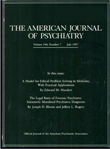Vulnerability of Jews to affective disorders
Abstract
OBJECTIVE: Psychiatric literature over the past 100 years suggests that Jews are at higher risk for affective disorders than numbers of other religious groups. To examine these claims, the authors analyzed data from the National Institute of Mental Health Epidemiologic Catchment Area (ECA) study. In addition, the relationships among gender, alcoholism, and major depression were investigated. METHOD: The period prevalence and lifetime rates of DSM-III major depression among Jews, Catholics, Protestants, individuals in other religious groups, and individuals with no religious affiliation were examined in the Los Angeles and New Haven, Conn., ECA data. Logistic regression with covariates for site, gender, marital status, and socioeconomic status was used to estimate odds ratios and 95% confidence intervals. The calculated rates, based on the combined data from ECA study waves 1 and 2 for the white population, were weighted according to the 1980 U.S. population census. Female-to-male rate ratios and rates of alcohol abuse/dependence were also obtained. RESULTS: While no differences were found among females, Jewish males had significantly higher rates of major depression than Catholics, Protestants, and all non-Jews combined. Jews had a 1:1 female-to-male ratio for major depression, in contrast to the other religious groups, which approached the universal 2:1 ratio. Rates of alcohol abuse/dependence were inversely related to rates of major depression. CONCLUSIONS: The results support only in part the earlier reports that Jews have higher rates of depression. The equal gender distribution of major depression among Jews may be associated with the lower rate of alcoholism among Jewish males.



